F L A U N T


Immediately upon greeting Tchotchke, I am complimented on my bangs. It feels fitting; bangs are, after all, the very reason Tchotchke exists. Anastasia Sanchez (vocals, drums) and Eva Chambers (bass, keys, vocals) first crossed paths in 2014 while fixing their own in the mirror of a Los Angeles high school locker room. “We were like, ‘Oh, we’re the same,” Sanchez laughs, remembering that moment. “It was instantaneous.” The two bonded over music, vintage dolls, and the kind of teenage obsessions that feel trivial until they form the foundation of a lifelong friendship. Several years and several bands later, Emily Tooraen (guitar, vocals) joined them, and everything finally fell into place. “I think we realized we were all just weird in the same way,” Tooraen says. “That’s what makes it work.”
Now based in New York, the “diva rock” trio has become known for their sugary harmonies, cheeky wit, and hyperfeminine aesthetic—a blend they fully embrace on their second album, Playin’ Dumb. The record, produced by the Lemon Twigs, is more sophisticated and layered than their 2022 debut, and yet it leans harder into girlhood, melodrama, and chatter. As Chambers puts it, “I feel like, when you listen to a girl band, you feel like they’re friends confiding in you, and that’s what we kind of wanted to do with this album. We’re friends.”
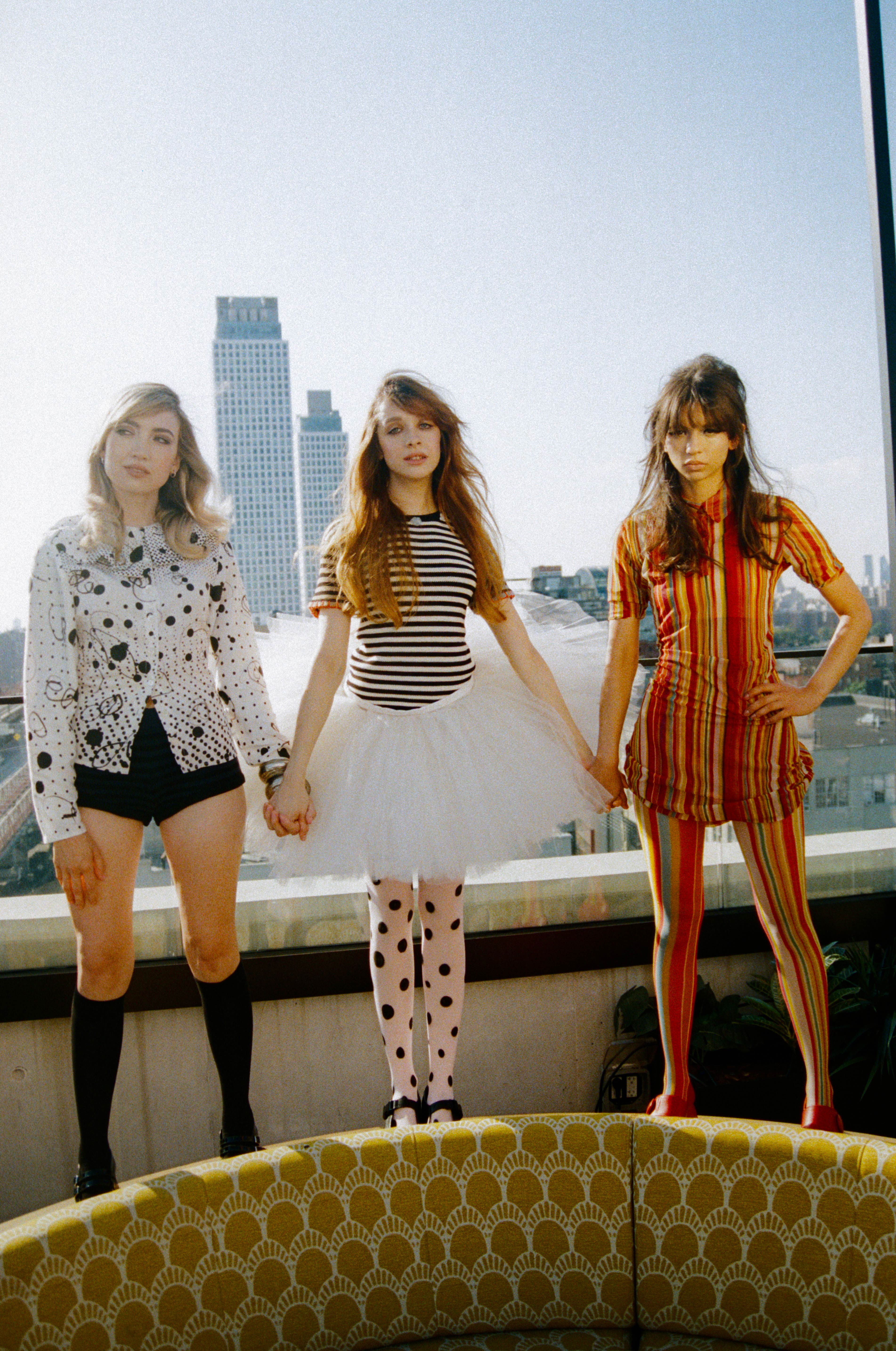
And that intimacy is the marrow of Tchotchke: three girls talking over one another, finishing each other’s sentences, dissolving into giggles.
The three describe Playin’ Dumb almost like a character study. The record’s narrators are hyperfeminine caricatures, exaggerated versions of themselves, toeing the line between performance and authenticity. “It’s good to embrace the other parts of yourself that maybe you haven’t before,” Tooraen explains. “I think this is the most honest representation of our personalities.” That embrace of girlhood—rather than skirting around it—marks a turning point for Tchotchke. “Yeah, I don’t want to say [we] avoided it, but we kind of—maybe we did avoid it—being a girl band,” Chambers admits. “But with this album, we’re like, ‘We’re a girl band,’ like we’re gonna do girl. Even on a personal level, it was... what’s the word? Not healing. But, you know, I think we all kind of...” She trails off, searching. “It was something close.”
Fashion has become an extension of that declaration. Their stage costumes—retro silhouettes, dramatic eyeliner, bubblegum fabrics that glimmer under lights—allow them to lean further into the hyperfeminine world they’ve built and pose a stark contrast to their tomboy inner core. “When I was a teenager, I was like, ‘I’m wearing pants on stage,’” Chambers recalls. “But it doesn’t matter, because people will listen to women and take us seriously. If not, it’s because we weren’t taking ourselves seriously.”
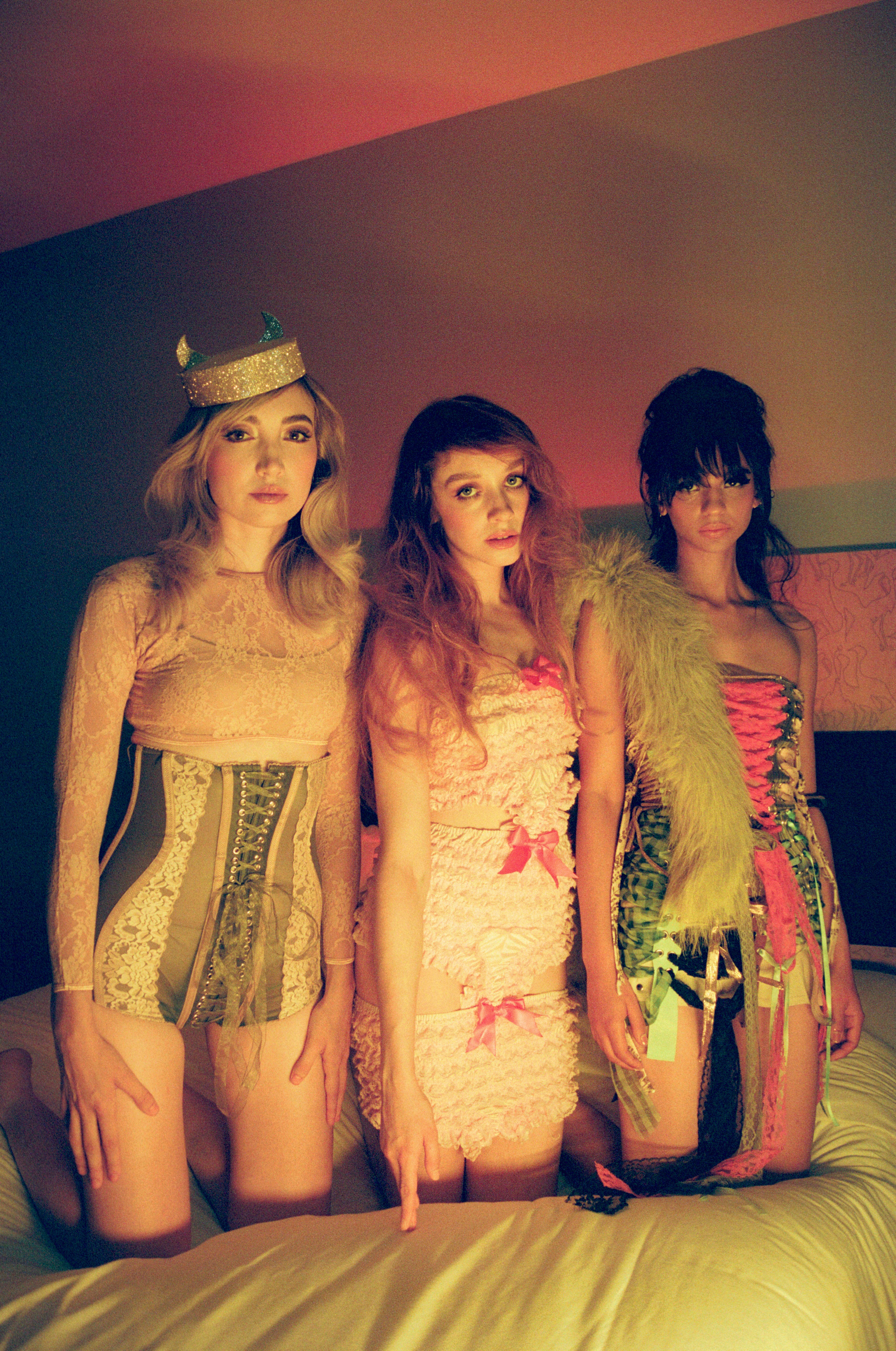
The album itself is shaped by extremes. The sessions took place over four seasons in a Brooklyn space the band nicknamed “The Veg Attic,” a studio perched above a working produce warehouse. “There’s always cabbage scattered on the street,” Eva remembers with a laugh, painting a picture of the odd charm of the location. The band recalls walking carefully over ice with guitars in hand during the winter, then months later sweating through humid summer sessions when the building’s heat and air conditioning refused to cooperate. Some days they wore coats indoors just to get through takes, other days they wiped sweat off their instruments between songs. The makeshift conditions could have been discouraging, but for Tchotchke the constant discomfort became part of the album’s DNA, pulling them closer together. As Chambers put it, the environment shaped the record’s grit: the bond of three friends making something joyful in less-than-perfect conditions.
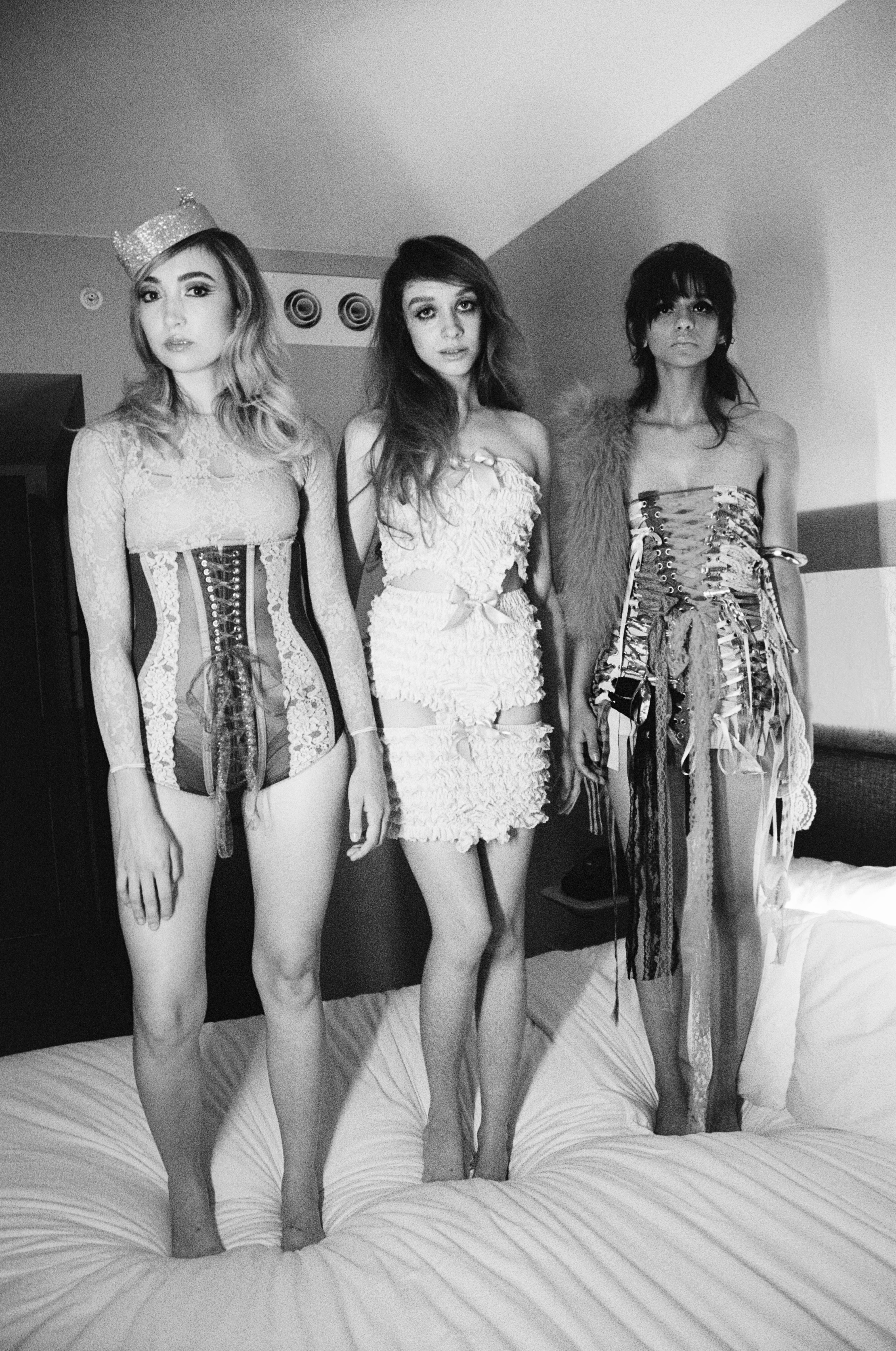
That chaos and the intimacy of their friendship spills into the record. “Did You Hear?” unfurls like whispered gossip in a school hallway—its repeated refrain “Did you hear what he did to me?” feels like both confessional and performance. “We wanted it to sound like eavesdropping,” Tooraen says. On “Poor Girl,” spoiled characters are lampooned with sweetness so sharp it stings. The bluesy “Now I Love You” tempers vulnerability with cheeky imagery (“taking over like a puppy with fleas”) while “Playin’ Dumb” (which the girls jokingly refer to as “the Tchotchke anthem”) slams into a wall-of-sound arrangement as Sanchez laments pretending to be dim so her boyfriend feels smart. “It’s funny but also infuriating,” she says. “Singing it together makes it cathartic.”
One of the most telling expansions of their universe comes not in the music but in the packaging. Chambers designed a board game to accompany the vinyl, filled with gossip prompts, truth-or-dare cards, and playful instructions that echo the themes of the album. “It’s silly,” she shrugs, grinning. “But that’s the point. It’s a way to really immerse yourself in the world of the album, to take a further step.” The game board itself is drenched in color and detail, like a collage of the band’s private jokes and inside references, a tactile map of their friendship. To play it is to fall into their chatter, to swap secrets, to dare each other—exactly the energy they wanted to bottle in the songs. It’s not merch in the conventional sense but a continuation of the record, a way of making the album interactive, personal, and unavoidably girlish, a sense of playfulness that bleeds into their live shows as well.
Touring with King Tuff, Broncho, The Gossip, and Hunx & His Punx, Tchotchke has sharpened their stage presence while never losing their girl-group chaos. On stage, Sanchez sings from behind the drum kit, Chambers anchors the low end with bass and keys, and Tooraen’s guitar cuts sharp lines through their harmonies. Their movements are unpolished in the best way—half choreography, half instinctive bouncing around—and the banter between songs often blurs into jokes, confessions, and laughter. The effect is less about presenting a polished image and more about pulling the crowd into their orbit. “We don’t want to look too cool,” Tooraen insists. “We want it to feel fun. Like you’re invited to the sleepover.”
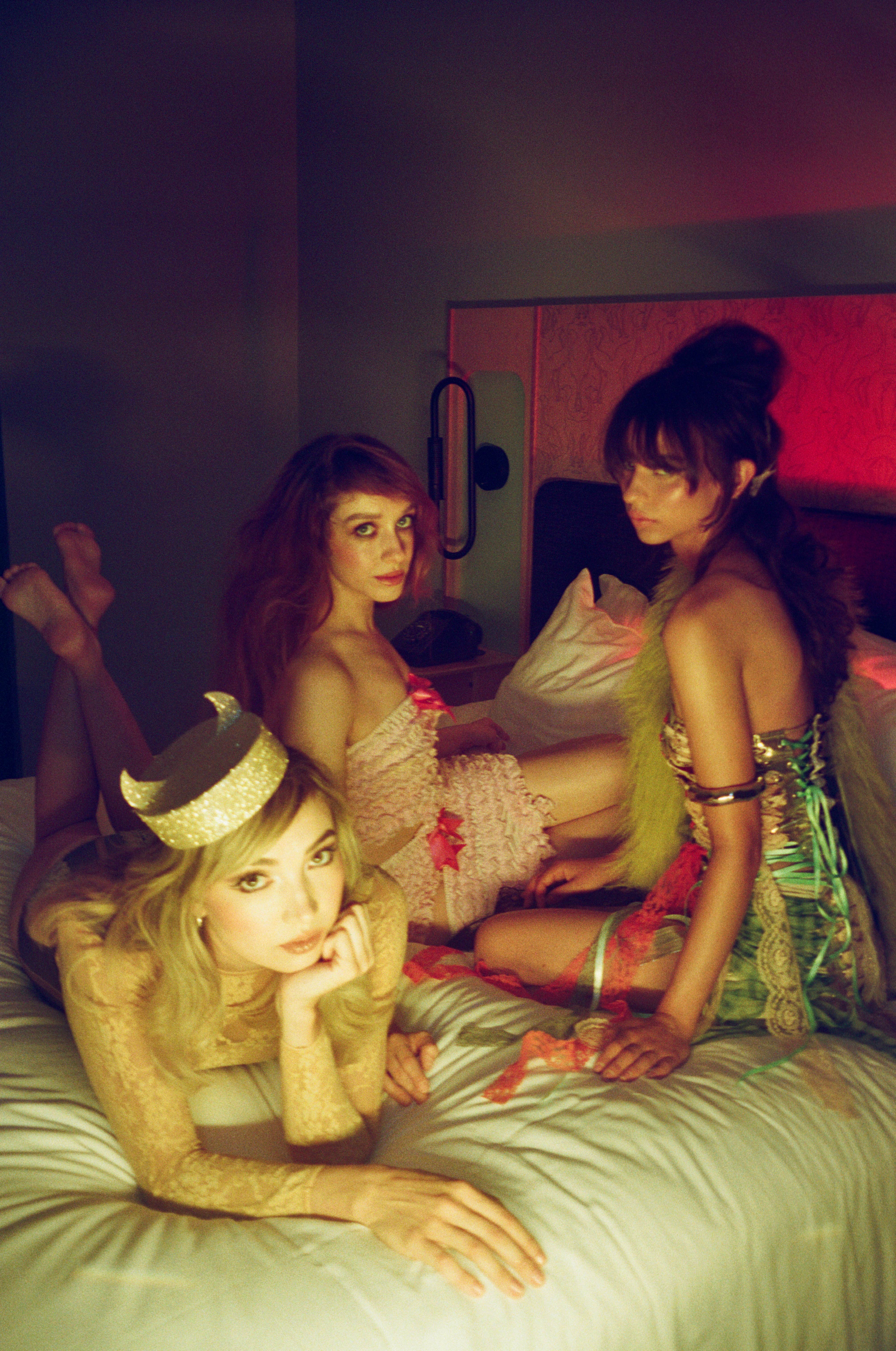
Noise, in Tchotchke’s world, is communal. When speaking with the band, it’s difficult to not trail off into tangents that dissolve into laughter. Sanchez continually refers to Chambers as a “gift from the gods.” Tooraen interjects with a compliment about Sanchez’s drumming on “Skipping Around,” and within seconds, they’re all laughing again. “This is literally what our songs sound like,” Sanchez jokes. “Just us talking over each other.”
And that’s what makes Playin’ Dumb resonate: the sense that behind the harmonies and the hooks are three best friends, still the girls with bangs in the high school mirror, still relishing the gossip, the melodrama, the laughter. Girlhood here isn’t a phase to outgrow, but a world to live in. As Chambers puts it, “I think just the band in general is such an outlet for the feminine energy—even down to what we wear on stage, we just give the full girly experience.”
Chambers calls the process of making Playin’ Dumb “an awakening.” She explains: “But at the same time, I feel like we had the safety net of, ‘it’s all supposed to be dumb,’ so let’s just... have fun. It’s supposed to be really fun and funny.” Tooraen jumps in to finish her thought: “Silly, dumb, yeah, for sure. We were in that world, so we were kind of free to explore. Even our ‘Poor Girl’ characters, I felt like, ‘Oh my god, I look crazy doing this crazy thing’—but that was the point.”
If you call them dumb, so be it. They’re dumb together, and that’s the whole point.
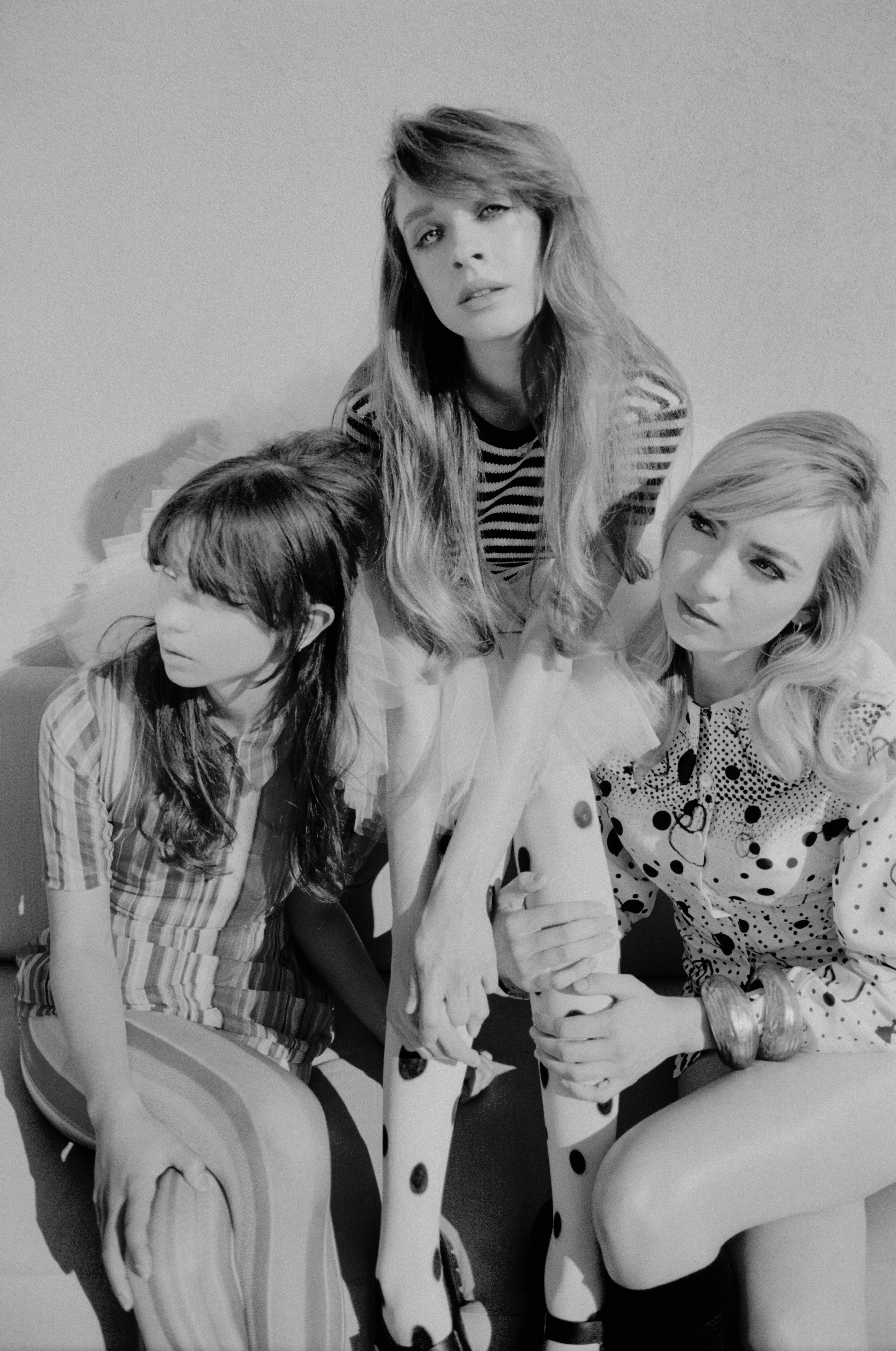
Photographed by Taryn Segal
Styled by Natasha Bock
Written by Melanie Perez
Hair: Li Murillo
Makeup: Ashleigh Ciucci
Photo Assistant: Ash Carpenter
Makeup Assistant: Joshua Hilari
Location: Moxy Williamsburg